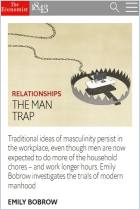Join getAbstract to access the summary!

Join getAbstract to access the summary!
Stephen Marche
The Unmade Bed
The Messy Truth About Men and Women in the 21st Century
Simon & Schuster, 2017
What's inside?
Evolving gender roles are reverberating through society and echoing in bedrooms, boardrooms and kitchens.
Recommendation
Stephen Marche engagingly highlights the friction at the intersection of everyday life and gender politics. He gave up his tenure-track teaching position so his family could move to Canada where his wife had been offered a great job. She became the primary breadwinner, and Marche stayed home to raise their children. His intellectual musings, political soliloquys, personal disclosures and occasional speeches make his essays as challenging as they are endearing. Happily, commentary by Marche’s wife, magazine editor Sarah Fulford, anchors the conversation. getAbstract finds that their fresh perspective is a treat for those navigating the evolving domestic and professional landscape and a boost for proponents of gender equality.
Summary
About the Author
Stephen Marche contributes to Esquire, The Atlantic and The New York Times and has written three novels and the nonfiction work, How Shakespeare Changed Everything. Sarah Fulford, editor in chief of Toronto Life, won two Canadian National Magazine Awards.


















Comment on this summary